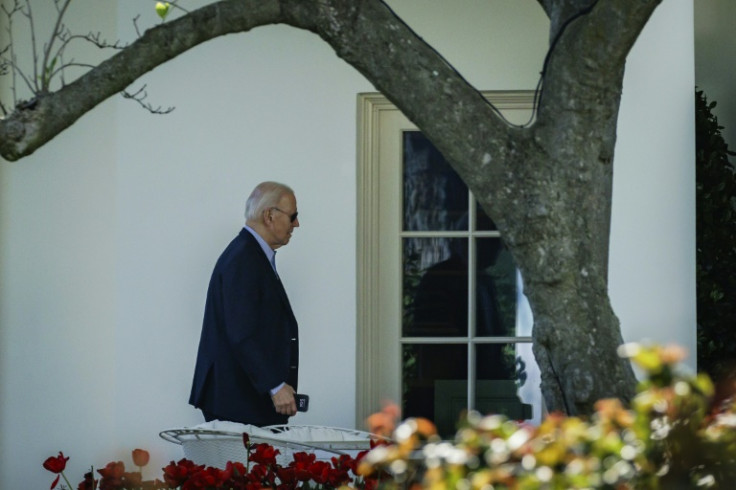Biden In 'Very Tough Spot' Trying To Stop Middle East Escalation

Iran's attack on Israel gives Joe Biden a familiar dilemma, but on steroids -- how to balance support for a difficult ally while preventing the nightmare scenario of a wider war?
Tensions with Benjamin Netanyahu over Israel's war on Gaza were papered over as the US president offered "ironclad" support, including shooting down Iranian drones.
But the White House has made it clear it does not want further escalation following Iran's unprecedented assault and will not support an Israeli counterattack that could trigger a full-blown regional conflict.
The question then for Biden, who is facing a tough reelection battle against Donald Trump in November, is what if Netanyahu goes ahead anyway as he has done in Gaza?
"It puts him in a very tough spot" Colin Clarke, Director of Research at the Soufan Group, told AFP.
"I think he's suspicious of Netanyahu's motives here... that Netanyahu is attempting to broaden the war throughout the region to deflect from how poorly the war is going for him in Gaza."
Biden has been trying to avoid a regional war that could suck the United States back into the Middle East ever since Hamas's October 7 attack and Israel's offensive on the Gaza Strip.
The 81-year-old has, however, struggled to use the leverage provided by the United States being Israel's main military supplier, especially given a long history of tense relations with Netanyahu.
Biden has been increasingly critical of the death toll in the Palestinian territory and even went as far as suggesting the US could limit military aid, but so far to little effect.
Iran's attack has seen Biden go back to showing overt support -- but at the same time scrambling to stop the crisis spiraling.
White House National Security Council spokesman John Kirby said Netanyahu was "well aware" that Biden did not want a "wider war".
"I would say that the prime minister is well aware that the president is not looking for a conflict with Iran, that the president doesn't want the tensions to escalate any more," Kirby told CBS News's Face the Nation.
Biden reportedly told Netanyahu when they spoke on Saturday that he should consider the successful defense of Israel from Iran's attack a "win" and that the US would not join a counterattack.
Washington's calculus looks to be that Iran got what it wanted with a show of force in retaliation for Israel's strike in Damascus earlier this month that killed a key Iranian general, and Israel has proved its defensive might.
"However, I fear the status quo will be short-lived," said James Ryan, Executive Director of the Middle East Research and Information Project, warning of a "dangerous spiral".
"I expect Biden to attempt to restrain Israeli responses, but Netanyahu has already shown a willingness to test any kind of limit Biden wishes to impose," he added.
"It's all very cynical now, unfortunately."
Biden's options for restraining Israel are likely to be limited at this stage to tough language in private and making threats in public.
"They've got themselves into a corner in many ways," said Clarke.
"I think they've overplayed their hand a little bit by saying the administration is considering cutting off weapons to the Israelis. It's never going to happen -- I think it's an empty threat, especially in an election year."
The US presidential election in November comes as Biden faces domestic political pressure on all sides when it comes to Israel.
Trump has led a chorus of Republicans accusing Biden of being weak on the issue -- while young and left-wing voters in particular are angered by his failure to stop the bloodshed in Gaza.
Netanyahu, facing his own political and legal issues at home, would now be able to use the Iran attacks to "paper over the very real rifts that exist" with Washington to Gaza, said Clarke.
"If he can drag this out until November, he's hoping for a Trump victory," said Clarke.
"And then he's hoping essentially for carte blanche to do whatever he needs to do, not only in the region, but to stay in power, to stay out of prison."
© Copyright AFP {{Year}}. All rights reserved.





















